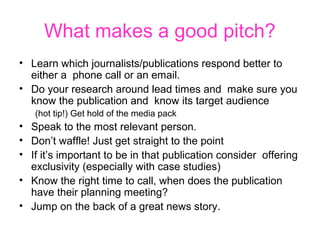How to pitch to journalists
- 1. Pitching to journalists made easy by Jo Waters
- 2. Who I am and why it might be worth listening to me • I’m a freelance health journalist with over 20 years experience as a writer, features editor and news editor. • I sit on the other side of the fence to you and hear hundreds of sell-ins and pitches and read thousands of press releases from PRs every year • I chair the Guild of Health Writers – an organisation set up to promote excellence in health and medical writing, which means I know lots of other journalists too – and know what they say they want as well
- 3. Who do I write for? You’ll see my work in the following outlets
- 4. What is in it for you? • Fine tune your pitching skills • Find your news angle/hook • Analyse the elements in a perfect pitch package - news angle, - timeliness, - credible research/ relevant expert input - compelling case study.
- 5. What we’re going to cover today • What makes a story • Best and worst way to pitch • Who to pitch to • Key elements of a successful pitch • Practical pitching exercise • Feedback • Summary
- 6. What makes a good story ? • It’s new! • If it has an impact on lots of people then it’s easier to sell to a wider audience. • Credible research. • Quotes or interview opportunities speaking to relevant experts. • Human stories.
- 7. What doesn’t always make the grade • It’s not new – it’s not a breakthrough • It doesn’t affect a lot of people • No case studies • Awareness week or an anniversary • No news angle/hook • There is no obvious story • It doesn’t fit the reader profile for that publication
- 8. Best way to pitch • Example of a Good Pitch • http://www.dailymail.co.uk/health/article-12322
- 9. What makes a good pitch? • Learn which journalists/publications respond better to either a phone call or an email. • Do your research around lead times and make sure you know the publication and know its target audience (hot tip!) Get hold of the media pack • Speak to the most relevant person. • Don’t waffle! Just get straight to the point • If it’s important to be in that publication consider offering exclusivity (especially with case studies) • Know the right time to call, when does the publication have their planning meeting? • Jump on the back of a great news story.
- 10. Worst type of pitch • When it sounds like the PR is reading from a script. • Opening line is too general there isn’t a hook. • You have to dig out what the news story is by quizzing the PR. • Timing is all wrong • Selling the story too widely.
- 11. How to decide who to pitch it to • Target your publications. – National/Regional newspapers – Radio/tv – online – Magazines – Trade journals – Decide where you want to be read about • Research publications – Lead times – Build up an ongoing relationship with individuals – Research who their readership/audience is
- 12. How you make the pitch • WHY is it a good story? – Should be explained in no more than 3 sentences – Think in terms of cover lines and headlines – Should be easy to sum up – Anticipate the questions journalists are likely to ask and are able to answer • WHY it is a good story NOW – Spell out what the hook is • WHY it is a good story for that outlet – Demonstrates you’ve thought it through
- 13. May the best pitch win! Get yourself into a team of 4. Each person makes a pitch to the group for a story they’d like to sell in to a journalist. Choose the best pitch. Work it up using the points discussed. Summarise your pitch onto a sheet of flip chart paper. Nominate one person from the group to pitch to the room. We’ll all give feedback. • You have 20 minutes in your groups.
- 14. Summary • Journalists always need ideas and stories • Research is king! • Timing is everything. • A phone call is never wasted you are building a relationship. • Ask for constructive feedback when your pitch doesn’t get coverage – it will help you next time
- 15. For further information on consultancy for charities please contact: Jo Waters on 0208 289 1777 or Nick James Tel: 0203 170 7563 Email: Jo_Waters15@hotmail.com Nick.James@TrioMedia.co.uk















